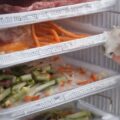Understanding the Importance of Food Safety
Food safety is a critical aspect of maintaining health, especially during unexpected events like a power outage. A lack of electricity can compromise the safety of the food stored in your refrigerator and freezer. Understanding how to manage food during these times can help prevent foodborne illnesses.
Preparing for a Power Outage
Preparation is key to ensuring food safety during a power outage. Here are some steps you can take:
- Keep an emergency supply of non-perishable food: Stock up on canned goods, dried fruits, nuts, and other items that do not require refrigeration.
- Freeze water containers: This helps keep your freezer cold for a longer period if the power goes out.
- Install a thermometer: Place thermometers in your refrigerator and freezer to monitor the temperature during an outage.
Managing Food During a Power Outage
When a power outage occurs, follow these guidelines to manage your food:
- Keep the refrigerator and freezer doors closed: This helps maintain the cold temperature. An unopened refrigerator will keep food safe for about 4 hours, while a full freezer will maintain its temperature for approximately 48 hours.
- Use a cooler: If the power outage is prolonged, transfer perishable items to a cooler filled with ice.
- Monitor temperatures: Ensure that the refrigerator stays below 40°F and the freezer at 0°F or below.
After the Power is Restored
Once the power is restored, it’s essential to evaluate the safety of your food:
- Check the temperature: If the refrigerator has been above 40°F for more than 2 hours, discard perishable items.
- Inspect food for spoilage: Look for signs such as unusual odors, colors, or textures.
- Use a food thermometer: Check the internal temperature of meat, poultry, and seafood. If they have been above 40°F for more than 2 hours, discard them.
Long-Term Strategies for Food Safety
To minimize the impact of future power outages on food safety, consider these long-term strategies:
- Invest in a generator: A backup generator can provide power to your refrigerator and freezer during outages.
- Regularly rotate stock: Use and replace refrigerated and frozen foods regularly to ensure freshness.
- Stay informed: Keep track of weather forecasts and power outage alerts to prepare in advance.
FAQ
1. How long can food stay safe in the refrigerator during a power outage?
An unopened refrigerator will keep food safe for about 4 hours. It’s important to keep the doors closed as much as possible to maintain the cold temperature.
2. What should I do if the power is out for more than 4 hours?
If the power outage lasts more than 4 hours, transfer perishable foods to a cooler with ice to keep them safe. Monitor the temperature to ensure it stays below 40°F.
3. Can I refreeze food that has thawed during a power outage?
Food that still contains ice crystals or is at 40°F or below can be safely refrozen. However, there may be a loss of quality.
4. How can I tell if my food is still safe to eat after a power outage?
Check the temperature of your refrigerator and freezer. If the refrigerator has been above 40°F for more than 2 hours, discard perishable items. Inspect for spoilage signs and use a food thermometer to check the internal temperature of meats.
5. What non-perishable foods should I keep in case of a power outage?
Keep a variety of canned goods, dried fruits, nuts, and other items that do not require refrigeration. These foods can provide nutrition without the need for electricity.









